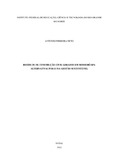Resíduos de construção civil gerados em Mossoró-RN: alternativas para uma gestão sustentável

Visualizar/
Data
2022-02-25Autor
Ferreira Neto, Antonio
http://lattes.cnpq.br/4823794716178948
Metadado
Mostrar registro completoResumo
Civil construction is an important segment of the Brazilian industry and contributes significantly to the economic development of the country, however, it is one of the sectors that has the highest consumption of natural resources, generating negative environmental impacts. In this way, it is essential to implement practices for sustainable management for this
type of waste. This project aims to evaluate the managemen t of civil construction waste in the
municipality of Mossoró RN and propose alternatives aimed at proper management and
environmental preservation. The research was divided into three stages. In Stage 1, a
methodological study of literature review was carried out, assessing the effectiveness of the
use of technological tools and computerized systems in CCR management activitie s . In Stage
2, a quantit ative diagnosis of CC W generation in the studied municipality was carried out,
estimated by the movement of cargo collected by the public and private sectors. The mapping
of disposal areas and the delimitation of two neighborhoods with the highest incidenc e of
solid generation was also carried out. Stage 3 is to development of an application software
prototype that serves as support for the management of civil construction waste. The
diagnosis showed a generation of 426.90 t /day of CC W , with a per capita ge neration of 1.39
kg/inhab.day, being the private sector responsible for about 71,67 % of the waste collection.
Inadequate destination of CCW in streets and vacant lots by the population, making it so that
the municipality uses public resources with waste co llection that is the responsibility of the
generator, and the destination of CC W to areas of accumulation in the soil point to the urgent
need for a civil construction waste management plan . The study also aims to implement points
to destination in the are a of greatest CC W generation and the possibilities of a recycling plant,
guiding waste management policies. With the proposal of the tool to be developed in
application format, it is expected to contribute to improve information on the subject,
establish dialogue between agents involved in the generation, collection and destination of
RCC, and thus reduce environmental, economic and social impacts , thus promoting
sustainable management.



